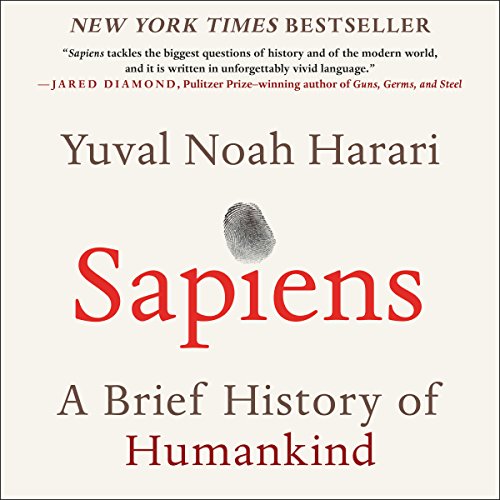
Sapiens
A Brief History of Humankind
No se pudo agregar al carrito
Add to Cart failed.
Error al Agregar a Lista de Deseos.
Error al eliminar de la lista de deseos.
Error al añadir a tu biblioteca
Error al seguir el podcast
Error al dejar de seguir el podcast
3 meses gratis
Compra ahora por $26.99
No default payment method selected.
We are sorry. We are not allowed to sell this product with the selected payment method
-
Narrado por:
-
Derek Perkins
From a renowned historian comes a groundbreaking narrative of humanity's creation and evolution - a number one international best seller - that explores the ways in which biology and history have defined us and enhanced our understanding of what it means to be "human".
One hundred thousand years ago, at least six different species of humans inhabited Earth. Yet today there is only one - Homo sapiens. What happened to the others? And what may happen to us?
Most books about the history of humanity pursue either a historical or a biological approach, but Dr. Yuval Noah Harari breaks the mold with this highly original book that begins about 70,000 years ago, with the appearance of modern cognition. From examining the role evolving humans have played in the global ecosystem to charting the rise of empires, Sapiens integrates history and science to reconsider accepted narratives, connect past developments with contemporary concerns, and examine specific events within the context of larger ideas.
Dr. Harari also compels us to look ahead, because, over the last few decades, humans have begun to bend laws of natural selection that have governed life for the past four billion years. We are acquiring the ability to design not only the world around us but also ourselves. Where is this leading us, and what do we want to become?
This provocative and insightful work is sure to spark debate and is essential for aficionados of Jared Diamond, James Gleick, Matt Ridley, Robert Wright, and Sharon Moalem.
©2015 Yuval Noah Harari (P)2017 HarperCollins PublishersListeners also enjoyed...




















Featured Article: The Best Nonfiction Audiobooks to Jump into Right Now
The best nonfiction audiobooks take involved, often intimidating subjects and reinvigorate them with sharp narration so you can stay focused and on track. In this list, we’ll share our picks for some of the best nonfiction audio out there, encompassing a wide array of topics—from the entire history of humanity to astrophysics to the American prison system. Engage with some of the most fascinating, deeply human real-life stories our catalog has to offer.
Las personas que vieron esto también vieron:





![Sapiens. De animales a dioses [Sapiens: From Animals to Gods] Audiolibro Por Yuval Noah Harari arte de portada](https://m.media-amazon.com/images/I/41hTjjv9E-L._SL240_.jpg)


![Sapiens. De animales a dioses (Castellano) [Sapiens: From Animals into Gods] Audiolibro Por Yuval Noah Harari, Joandomènec Ros i Aragonès arte de portada](https://m.media-amazon.com/images/I/41d5BYAtnCL._SL240_.jpg)









Excellent Read
Se ha producido un error. Vuelve a intentarlo dentro de unos minutos.
all the history you really need to know
Se ha producido un error. Vuelve a intentarlo dentro de unos minutos.
Extremely interesting.
Se ha producido un error. Vuelve a intentarlo dentro de unos minutos.
Enlightening and greatly written
Se ha producido un error. Vuelve a intentarlo dentro de unos minutos.
Il narratore (inglese) ha una voce tranquilla, comprensibile anche per un non madrelingua, e perfettamente adatta a questo tipo di opera.
molto interessante
Se ha producido un error. Vuelve a intentarlo dentro de unos minutos.
Little preachy, but very well written & researched
Se ha producido un error. Vuelve a intentarlo dentro de unos minutos.
Amazing book, great narrator
Se ha producido un error. Vuelve a intentarlo dentro de unos minutos.
Excellent Audiobook!
Se ha producido un error. Vuelve a intentarlo dentro de unos minutos.
Exceptional
Se ha producido un error. Vuelve a intentarlo dentro de unos minutos.
This book should be studied in schools
Se ha producido un error. Vuelve a intentarlo dentro de unos minutos.




